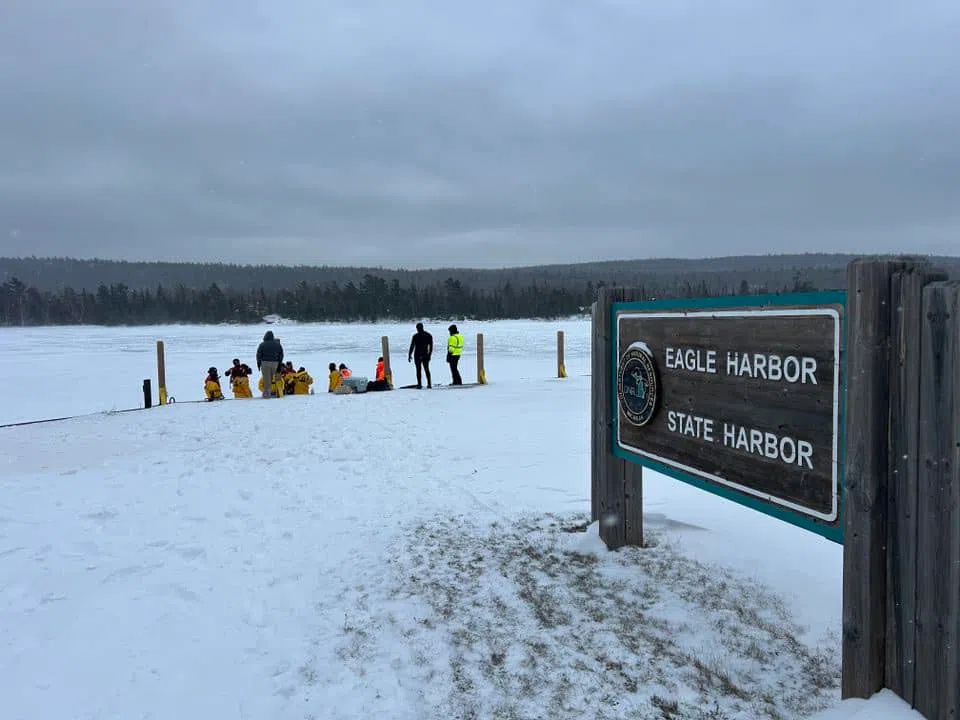First responders prepare for situations they hope no one will find themselves in. But practice is everything in remote regions of the Upper Peninsula. Keweenaw County offers expansive wilderness and miles of coastline to explore. Last weekend first responder teams worked with the United States Coast Guard to train for ice rescue operations, including the Keweenaw County Sheriff, Keweenaw County Search and Rescue, and the Eagle Harbor Fire Department.
It’s a basic level of ice training where our rescuers can get out, get into the water, and understand how to not only rescue somebody else but rescue themselves if they have to get out of a situation. – Curt Pennala, Sheriff, Keweenaw County Sheriff’s Office
Keweenaw County Sheriff Curt Pennala says that water rescues offer different challenges in the winter compared to the summer. Summer rescues most often require watercraft, but in the winter responders have to trek out over the ice to the incident site.
We do have throwable discs if somebody is floating offshore. You know, maybe we’re swimming out to rescue somebody versus in the winter so in our winter rescues The equipment is a little bit different. Each rescuer has their suit that they’ll wear out there and they’ll be going out on foot, you know try to make contact with that person in the water and Utilize both that suit and some rope techniques to get them out of the water. – Curt Pennala, Sheriff, Keweenaw County Sheriff’s Office
Training opportunities such as with the US Coast Guard’s portage station provide first responders with the skills, tools, and knowledge to perform ice rescues. Possibly before the USCG can respond from the station in Dollar Bay. Training the region’s responders, says pennala, adds to the community’s ability to act quickly in an emergency.
Lake Superior has some of the coolest-looking shelf ice, but at the same time, it can be very dangerous. Realizing that underneath all them ice shelves, there’s open water, it creates air pockets under there, so it is very dangerous. If you’re going out ice fishing, make sure you take a spud with you and check the ice for depth. Make sure you know what the depths are that you should be on that ice, whether you’re on it with your body or you’re on some type of equipment like a snowmobile or ATV. – Curt Pennala, Sheriff, Keweenaw County Sheriff’s Office
Every second in an emergency situation counts. And when temperatures drop below freezing time becomes a larger obstacle to work around. First responder teams want the community to recreate and enjoy the region’s vast wilderness. But also keep caution in mind when participating in outdoor recreation that carries risks of danger.
Yeah, so the call would, you know, obviously we’d take a 911 call that would be put out to our officers. We’d utilize our search and rescue team, fire department, and anybody we can get to that scene. And at the same time, have the Coast Guard dispatch to that incident. And hopefully, as quick as we can get rescuers out there, we can get them, you know, into the equipment that they have and out onto the ice to try to perform some type of rescue. – Curt Pennala, Sheriff, Keweenaw County Sheriff’s Office
In recent years law enforcement and search and rescue teams throughout the region have increased training opportunities. Coinciding with more calls for service since the Covid pandemic and an influx of new people visiting the outdoors. Search and rescue teams around the region work as volunteers, and are committed to protecting the community when called upon.







